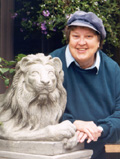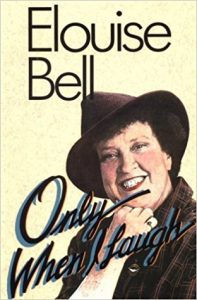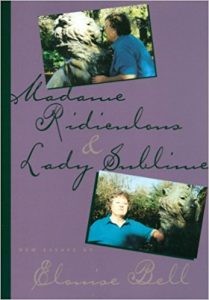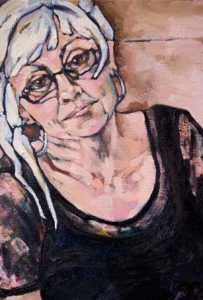 We note with great sorrow the passing of Elouise Mildred Bell, one of the greats of Mormon literature, education, and feminism, on September 30, 2017. Elouise was born on September 10, 1935, in Scranton Pennsylvania. She was the daughter of Alexander Hurlow and Esther Myra (Beppler) Bell. She received her bachelor’s degree in English and journalism at the University of Arizona in 1957, graduating magna cum laude. While at Arizona, she was baptized a member of the Church of Jesus Christ of Latter-day Saints. She earned a master’s degree in English at Brigham Young University in 1959. She served an LDS mission in France in 1961-1963.
We note with great sorrow the passing of Elouise Mildred Bell, one of the greats of Mormon literature, education, and feminism, on September 30, 2017. Elouise was born on September 10, 1935, in Scranton Pennsylvania. She was the daughter of Alexander Hurlow and Esther Myra (Beppler) Bell. She received her bachelor’s degree in English and journalism at the University of Arizona in 1957, graduating magna cum laude. While at Arizona, she was baptized a member of the Church of Jesus Christ of Latter-day Saints. She earned a master’s degree in English at Brigham Young University in 1959. She served an LDS mission in France in 1961-1963.
Bell taught in the BYU English Department from 1963 through 1994. She served as composition coordinator and also received the Karl G. Maeser Award for Distinguished Teaching. In 1986, she received BYU’s Alcuin Award for excellence in teaching, and in 1990, she was awarded a General Education Professorship for contributions to the university’s general education curriculum. She eventually became Associate Dean of General and Honors Education. On various sabbaticals, she taught at the University of Arizona, the University of Massachusetts at Amherst, and Berzenyi College in Hungary.
Bell was actively involved in issues around women. She served on the LDS Young Women general board in 1973–1975. She participated in the U.N. International Women’s Year Conference and Tribune in Mexico City in June-July 1975. Her talk “The Implications of Feminism for BYU,” given at a BYU forum on September 30, 1975, and published BYU Studies Quarterly, has been described as a pivotal work in influencing LDS attitudes towards feminism. Joanna Brooks, Rachel Hunt Steenblik, and Hannah Wheelwright included the talk in their 2015 collection Mormon Feminism: Essential Writings. In their introduction to the piece, they wrote,
Bell was the first BYU woman faculty member to deliver a forum address. She arrived, she remembers, having broken both ankles in a fall, in a wheelchair and wearing a pantsuit—even though pantsuits were forbidden for female faculty under the campus dress code—and was introduced by university president Dallin H. Oaks. Reaching into Mormon women’s activist nineteenth-century history, Bell encouraged BYU women students to take their education more seriously and urged her entire audience to recognize the women’s movement as one of history’s most significant advances and worthy causes. Bell would have a thirty-five year career as a BYU faculty member and administrator. “Looking back on my career at BYU—which I absolutely loved, all things considered—I feel now that perhaps I was too cautious,” Bell now believes. But her words on Sept. 30, 1975, would prove to have tremendous impact. A young BYU graduate student in the classics named Margaret Merrill (later Toscano) was in the audience for Bell’s forum that day. “I was on fire. I had been so worried about gender issues and I was going through this huge spiritual struggle about whether there was a place for me in the Mormon Church because I didn’t feel like what I cared about mattered. And I had always been an intellectual woman. All my friends I talked ideas to were men. I wondered, where are the other women who are intellectual, who are interested in ideas?”
Here is a selection from Bell’s 1975 address.
In my understanding, a feminist is a person, whether a man or a woman, who believes that historically there have been inequities in the education and treatment of women in several or many spheres of society and who is interested in correcting those inequities as he or she sees them . . . I truly believe that the righteous goals of feminism, the wide goals as opposed to the unwise goals, will help us prepare a generation of women fore fit than ever before to bear their joint responsibility in establishing the kingdom of God. Let it no be said that BYU or the Latter-day Saint people stood on the sidelines while great and needed social reforms were taking place in the twentieth century. Rather let it be said that we took our rightful positions in the forefront of that movement.
Bell was an active participant in the Salt Lake City-based feminist magazine Network. She wrote a monthly column for the magazine in 1978-1989, and was an editor for the magazine during many of those years. In 1983, the Utah Women’s Political Caucus honored her with a Susa Young Gates Award for “contributing to human rights and the cause of women.” She was a member of the Utah Governor’s Commission on Child Abuse in 1989-1992. The Mormon Women’s Forum in 2011 honored her with their Eve Award.
Bell, according to her obituary in The Oklahoman, was in a same-sex relationship for twenty-five years with Margo E. LeVitre. LeVitre was also a returned missionary who had studied at BYU, and taught science and physical education at Provo High School for many years. They lived together in a home in Orem, apparently keeping their relationship secret from the BYU administration. The relationship probably ended by the time Bell left Utah in 1999. LeVitre passed away in 2008.
Bell published frequently, including literary studies, poetry, personal essays, humor, and a one-woman play. A long but incomplete list of her published works has been compiled by the Mormon Literature Database. She served on the Utah Arts Council. Her first book was Shall I Ever Forget This Day? Excerpts from the Diaries of Carol Lynn Pearson (Bookcraft, 1980). Pearson recently wrote, “Many years ago Elouise wanted to write a book about diary-keeping, using my early diaries as an example of how fun and useful this can be. As she was a very persuasive woman, I allowed her to come to my home for a couple of weeks and read to her heart’s content. She groaned and laughed and we talked non-stop. The result was a book called Will I Ever Forget This Day?”
 Many of her Network columns and other writings were published as Only When I Laugh (Signature, 1990). The entire book is available at the Signature website. Probably the most famous piece in the book is “The Meeting”, a satire which imagines a gender-flipped Mormon Sacrament Meeting, first published anonymously in Dialogue in Winter 1981. Only When I Laugh was given the 1990 Association for Mormon Letters Award for Personal Essay. The AML Awards committee wrote this citation for the award.
Many of her Network columns and other writings were published as Only When I Laugh (Signature, 1990). The entire book is available at the Signature website. Probably the most famous piece in the book is “The Meeting”, a satire which imagines a gender-flipped Mormon Sacrament Meeting, first published anonymously in Dialogue in Winter 1981. Only When I Laugh was given the 1990 Association for Mormon Letters Award for Personal Essay. The AML Awards committee wrote this citation for the award.
Discussing this collection of essays, the awards committee states, “As Elouise Bell explains it: ‘The title of this collection . . . comes . . . from the old story about a man who had been run through with a large spear. When asked if it hurt terribly, he replied, “only when I laugh.” Sometimes it hurts whether we laugh or not.’ Reading these essays, I wept, I wailed, I gnashed my teeth. But mostly I laughed. “For many years, Elouise Bell has explored the range of the personal essay, trying it on like a body-suit, finding where it bends, where it stretches, where it fits best, where it’s a bit loose and wrinkled. most of these trials have been undertaken for Network magazine. To it, for its deadlines, we owe an immense debt of gratitude; without them, the tongue of this Bell might never have rung so many changes on the form. “And such changes! There is the voice of “When Nice Ain’t so Nice” warning us of the danger to our society of suppressing our feelings, especially anger. There is the backward unmasking of our Sunday rituals in “The Meeting,” loosing a friction of nervous laughter that scrubs away the local anesthetic which lets us sleep through Sacrament (and other meetings). There is the clever update of one-upmanship in “Power Ploys” lingering like a message on an answering machine, to remind us each time we take it up how phony are our pretensions. (And a reminder in “Three for the Holidays” of how empty our post-tensions are.) “In all these essays—wry, funny, sly, outrageous, clever, witty, dry-eyed, in memoriam—Elouise Bell releases the tensions that we all feel, sometimes with gales of raucous laughter, sometimes with punctures to our pride, sometimes with a clean surgical swipe. The tickling we feel in the aftermath is the itch of healing, the healing of the wound made by that large spear.”
 Bell wrote a one-woman play, Aunt Patty Remembers, based on the life of Mormon pioneer midwife Patty Bartlett Sessions. She wrote the play as a 45-minuted monologue in 1984, after she was invited to join a touring company of Western storytellers, which was sponsored by the National Endowment for the Humanities. She performed the play dozens of times over the next dozen years, including as a speaker for the Utah Arts Council’s program of lectures. An audio cassette version was produced by Aspen Audio Library in 1992. Ivan Lincoln, in a 1996 Deseret News article about a performance, wrote, “Bell’s piece is a brief glimpse of Patty Bartlett Sessions, described as an American pioneer, a devout Mormon and a stalwart, free-spirited woman. The portrayal invites audiences to know “Aunt Patty” – an 18th century midwife, paramedic, businesswoman, farmer, wife and mother.”
Bell wrote a one-woman play, Aunt Patty Remembers, based on the life of Mormon pioneer midwife Patty Bartlett Sessions. She wrote the play as a 45-minuted monologue in 1984, after she was invited to join a touring company of Western storytellers, which was sponsored by the National Endowment for the Humanities. She performed the play dozens of times over the next dozen years, including as a speaker for the Utah Arts Council’s program of lectures. An audio cassette version was produced by Aspen Audio Library in 1992. Ivan Lincoln, in a 1996 Deseret News article about a performance, wrote, “Bell’s piece is a brief glimpse of Patty Bartlett Sessions, described as an American pioneer, a devout Mormon and a stalwart, free-spirited woman. The portrayal invites audiences to know “Aunt Patty” – an 18th century midwife, paramedic, businesswoman, farmer, wife and mother.”
Elouise wrote for the Salt Lake Tribune as a columnist in 1995-1999. She received an award for excellence from the Society of Professional Journalists for her writings.
Bell’s next book was another collection of essays, Madame Ridiculous and Lady Sublime (Signature, 2001). Bell’s essays, poems, and articles were published in English Journal, Women Studies Quarterly, Weber Studies, BYU Studies, Network, Exponent II, Dialogue, Sunstone, The New Era, and the Ensign. Her poetry was collected in Harvest: Contemporary Mormon Poems (Signature, 1989).
“This Do in Remembrance of Me” is a poem that first appeared in The Ensign, April 1980. It was collected in Harvest: Contemporary Mormon Poems.
Blinking out into the April brightness
One Sabbath after church,
I heard a Saint expound to a politely listening friend.
“With us, the sacrament is just a symbol.”
“Just a symbol.”
All the sunlong day and starlong night
Those slippery words shadowed me.
True enough: the bread but bread.
Yet the body offered up was real,
Its shattered nerves most verifiable
As pain spiked along the net.
Right enough: the water nothing more
But the shed blood pulsed power-poor,
Streamed swift, then slow, to dry and cake
Down racked arms and flanks.
How pallid the bread when pale the memory.
Yet sweet the nourishment when we his Spirit summon
By rich remembering.
Every symbol has two halves.
But to us falls the matching.
What match we, then, in sacramental token?
What fit we to the water, and the bread?
Bell was a founding member of the Association for Mormon Letters in 1976. She was a member of the committee that decided the first AML Awards in 1978, and served on the AML board in the early 1980s. She participated in many of the early AML conferences, giving talks, chairing sessions, and acting as a discussant. For example, at the October 1979 AML conference, she presented “‘(Almost) All is Well’: Thematic Sophistication as an Index of Quality in Short Stories by L.D.S. Student Writers”, which appeared in the 1980-82 AML Proceedings. It was one of many times she acted as a critical but supportive voice for LDS authors. Besides her work as a creative writing teacher, she frequently wrote reviews of LDS authored works in Dialogue, Sunstone, The AML Newsletter, and Irreantum. Bell was given an Honorary Lifetime Membership by the AML in 1989.
Elouise retired from BYU in 1994, and moved from Orem, Utah to Myrtle Beach, South Carolina in 1999, where she taught classes as part of Coastal Carolina University’s Lifelong Learning Program. According to “Introducing Elouise Bell” a guest post she wrote at By Common Consent, in 2005 she moved to Edmond, Oklahoma, “where among other things, she reads books onto tape for the Oklahoma Library for the Blind and is learning the tango.” In 2007-2010 she frequently wrote in her blog. In the 2000s she began a relationship with Nancy R. Jefferis. Elouise and Nancy attended a Unitarian Universalist Church in Oklahoma, and were married in April 2015.

In recent years she had continued to write essays for Sunstone, including “Is There Beauty in Your Bucket” in 2014. That essay is being republished in Moth and Rust: Mormon Encounters with Death, edited by Stephen Carter and published by Signature later this month. Here is an excerpt.
A bucket list doesn’t require that you have a fortune in the bank. It may deplete our funds, but the smallest adventures can add richness to our lives. We grow up letting other people set our goals: parents, religious leaders, teachers, bosses, even authors of books or the leaders of groups we belong to . . . Old people find less flashy experiences more central to their sense of self and ultimately more satisfying. A beautiful rose garden they’ve nurtured, a baby quilt they’ve made for a grandchild, a rare bird they’ve added to the Lifetime Bird List—these are the things that for them outweigh the cruises, the pyramids, the public recognition. Instead of being famous, they covet quiet personal moments. . . Mormons live in a subculture full of specific guidelines, expectations, and restrictions. I sometimes wonder if the impulse to go on big adventures wanes more quickly among us than in less prescriptive societies. In Zion, for the elders male and female, many duties remain, but perhaps some dreams are too long deferred.
Elouise Bell was a force who inspired countless authors, feminists, and lovers of the word. We miss her, and pray that her family and friends will be comforted.
(Thank you to the authors of the Mormon Wiki article on Elouise, which was the source of some of this material.)

Here is a memorial article by Paul Rolly in the Salt Lake Tribune, which was based my article, but also includes quotes from her friends Susan Elizabeth Howe and Robert Kirby. http://www.sltrib.com/news/2017/10/06/teacher-and-author-elouise-bell-was-an-early-mormon-feminist/
Also, here is a memorial piece by Margaret Blair Young. http://www.patheos.com/blogs/welcometable/2017/10/gift-dear-elouise-bell-signature-books/
I have edited this piece, based on information that I did not have when I first wrote it. An obituary of Bell, probably written by her wife Nancy, appeared in The Oklahoman a month after Bell’s death. It said that Bell was partnered for twenty-five years with Margo E. LeVitre. LeVitre earned a B.A. at Brigham Young University, and then served a mission for The Church of Jesus Christ of Latter-day Saints in Canada. She went on to receive an M.A. from BYU, then taught science and physical education at Provo High School for many years. She never married, and passed away in 2008. Bell and LeVitre shared a house in Orem. It appears that Bell and LeVitre’s relationship ended sometime before Bell moved from Utah to South Carolina in 1999. If Bell and LeVitre had a 25-year relationship, then it probably took place over much of Bell’s time at BYU, 1963-1994. BYU had made not admitting homosexual students a policy in 1962, and there were attempts to surveil and entrap students in the 1970s. It is remarkable that Bell was able to keep her relationship a secret from the administration for so many years. https://www.legacy.com/obituaries/oklahoman/obituary.aspx?n=elouise-bell&pid=187085032&fhid=4588